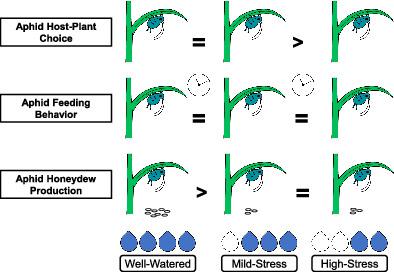当前位置:
X-MOL 学术
›
Ecol. Entomol.
›
论文详情
Our official English website, www.x-mol.net, welcomes your
feedback! (Note: you will need to create a separate account there.)
Plant water stress intensity mediates aphid host choice and feeding behaviour
Ecological Entomology ( IF 2.0 ) Pub Date : 2020-08-19 , DOI: 10.1111/een.12928 Jessica Kansman 1 , Vamsi Nalam 2 , Punya Nachappa 2 , Deborah Finke 1
Ecological Entomology ( IF 2.0 ) Pub Date : 2020-08-19 , DOI: 10.1111/een.12928 Jessica Kansman 1 , Vamsi Nalam 2 , Punya Nachappa 2 , Deborah Finke 1
Affiliation

|
The effects of drought‐induced changes in plant quality on aphid performance and population growth is well‐studied. The response of aphid behaviour to plant water limitation has received less attention. Water limitation may affect host‐plant colonization by altering the attractiveness of plants. Additionally, plant water limitation may inhibit feeding site establishment and phloem ingestion. Our goal was to examine bird cherry‐oat aphid (Rhopalosiphum padi L.) host selection and feeding behaviour under water limitation. We assessed aphid response to well‐watered, mildly‐stressed, and highly‐stressed wheat (Triticum aestivum L.) by evaluating (i) host‐plant selection through two‐choice assays, (ii) feeding behaviour using the electrical penetration graph technique, and (iii) phloem ingestion by quantifying honeydew production. Aphids were less likely to select highly stressed plants than a mildly stressed or well‐watered alternative. Aphids did not distinguish between mildly stressed and well‐watered plants. Aphid feeding behaviours, including duration of phloem ingestion, were not affected by water availability. However, honeydew production was reduced under both levels of water limitation. These results suggest that the volume of phloem ingested by aphids per unit time declined on stressed plants. The combination of lower colonization and diminished access to food on stressed plants may lead to a reduction in aphid abundance, independent of the direct effects of nutrition on individual aphid performance. This study highlights the potential contribution of herbivore behaviour to documented changes in aphid abundance on stressed plants and underscores the important role of plant water stress intensity in mediating plant‐herbivore interactions.
中文翻译:

植物水分胁迫强度介导蚜虫寄主选择和摄食行为
干旱引起的植物质量变化对蚜虫性能和种群增长的影响已得到充分研究。蚜虫行为对植物水分限制的反应较少受到关注。水分限制可能通过改变植物的吸引力来影响寄主植物的定植。此外,植物水分限制可能会抑制摄食部位的建立和韧皮部的摄入。我们的目标是研究鸟樱桃燕麦蚜虫(Rhopalosiphum padi L.)在水分限制下的宿主选择和摄食行为。我们通过评估 (i) 通过双选择试验选择寄主植物,(ii) 使用电穿透图技术的取食行为来评估蚜虫对充分浇水、轻度胁迫和高度胁迫的小麦 (Triticum aestivum L.) 的反应,和 (iii) 通过量化蜜露产量来摄取韧皮部。与轻度胁迫或浇水充足的植物相比,蚜虫不太可能选择高度胁迫的植物。蚜虫不能区分轻度压力和浇水充足的植物。蚜虫的摄食行为,包括韧皮部摄入的持续时间,不受水供应情况的影响。然而,在两种限水水平下,蜜露产量都减少了。这些结果表明,在受胁迫的植物上,每单位时间蚜虫摄取的韧皮部体积下降。受胁迫植物的定植减少和食物获取减少的结合可能导致蚜虫丰度的减少,这与营养对个体蚜虫性能的直接影响无关。
更新日期:2020-08-19
中文翻译:

植物水分胁迫强度介导蚜虫寄主选择和摄食行为
干旱引起的植物质量变化对蚜虫性能和种群增长的影响已得到充分研究。蚜虫行为对植物水分限制的反应较少受到关注。水分限制可能通过改变植物的吸引力来影响寄主植物的定植。此外,植物水分限制可能会抑制摄食部位的建立和韧皮部的摄入。我们的目标是研究鸟樱桃燕麦蚜虫(Rhopalosiphum padi L.)在水分限制下的宿主选择和摄食行为。我们通过评估 (i) 通过双选择试验选择寄主植物,(ii) 使用电穿透图技术的取食行为来评估蚜虫对充分浇水、轻度胁迫和高度胁迫的小麦 (Triticum aestivum L.) 的反应,和 (iii) 通过量化蜜露产量来摄取韧皮部。与轻度胁迫或浇水充足的植物相比,蚜虫不太可能选择高度胁迫的植物。蚜虫不能区分轻度压力和浇水充足的植物。蚜虫的摄食行为,包括韧皮部摄入的持续时间,不受水供应情况的影响。然而,在两种限水水平下,蜜露产量都减少了。这些结果表明,在受胁迫的植物上,每单位时间蚜虫摄取的韧皮部体积下降。受胁迫植物的定植减少和食物获取减少的结合可能导致蚜虫丰度的减少,这与营养对个体蚜虫性能的直接影响无关。











































 京公网安备 11010802027423号
京公网安备 11010802027423号